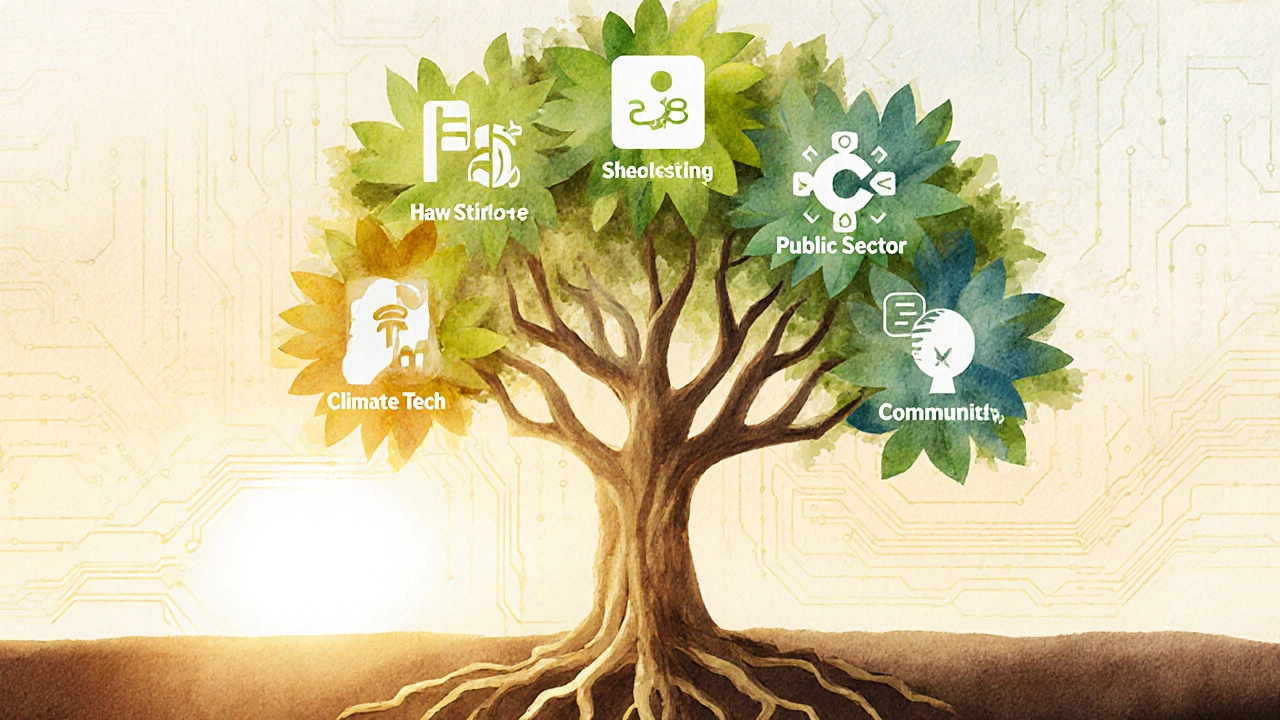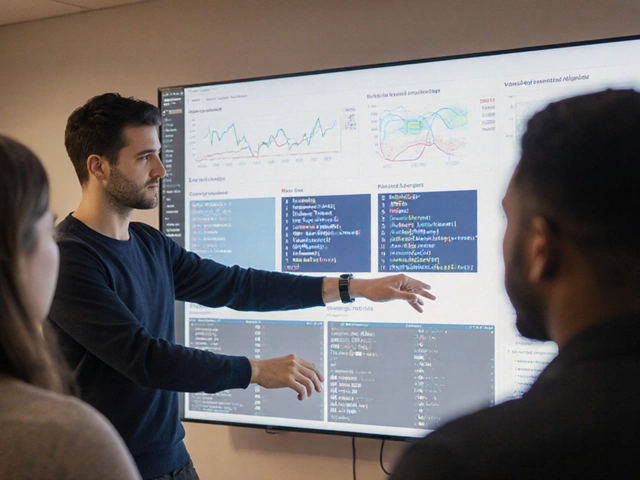Developer Salary Estimator
Estimate Your 2025 Developer Salary
Two years ago, headlines screamed that tech layoffs had killed coding careers. But if you’re sitting at home wondering if learning to code is still worth it, the data tells a different story. In 2025, there are over 2.3 million unfilled software development roles in the U.S. alone - and that’s not counting Europe, India, or Canada. Companies aren’t hiring fewer coders. They’re just hiring coders who can do more than write basic scripts.
Why the myth that coders aren’t needed persists
The confusion comes from a shift, not a collapse. In 2020, you could get a job by learning HTML, CSS, and a bit of JavaScript from a 12-hour YouTube course. That’s not enough anymore. Companies aren’t firing coders - they’re firing people who think coding is just typing commands into an editor. The real demand is for coders who understand systems, security, data, and user behavior.
Take the example of a small Scottish fintech startup in Edinburgh. Last year, they hired three junior developers. Two quit within six months. Why? They could build a login page but couldn’t explain how the database handled concurrent users or why their code slowed down under load. The third stayed - because they’d taken a course that taught them how to debug performance issues, not just copy-paste React components.
What skills are actually in demand right now
Here’s what employers are asking for in 2025:
- Cloud infrastructure - Not just using AWS, but knowing how to reduce costs by choosing the right instance types and auto-scaling rules. Companies saved 30-50% on cloud bills last year by hiring devs who understood this.
- AI integration - You don’t need to build LLMs from scratch. But if you can’t use an API to add chat features, summarize documents, or auto-tag user data, you’re falling behind.
- Security basics - SQL injection, XSS, and OAuth misconfigurations are still the top three reasons apps get hacked. Every job posting now asks for security awareness, even for front-end roles.
- Testing and debugging - Writing code that works on your machine isn’t enough. Employers want people who write unit tests, understand CI/CD pipelines, and can trace a bug from a user report to the exact line of code.
- Communication - The best coder in the world won’t get promoted if they can’t explain their work to a product manager or explain a bug fix to a non-technical client.
These aren’t "nice-to-haves." They’re now baseline expectations. A 2025 Stack Overflow survey showed that 78% of hiring managers rated "ability to solve real-world problems" as more important than "proficiency in a specific language."
Where the jobs are - and where they’re not
Not all coding jobs are created equal. Some areas are booming. Others are shrinking.
High demand:
- Healthcare software - Electronic records, appointment systems, and telehealth platforms need developers who understand HIPAA and patient data flows.
- Energy and manufacturing - Smart grids, IoT sensors, and automation systems in factories are hiring coders who can work with embedded systems and real-time data.
- Public sector tech - Governments in the UK, EU, and Canada are rushing to modernize legacy systems. Many still run on COBOL. Yes, COBOL. And they’re paying $80K+ to people who can update them.
- Climate tech - Carbon tracking apps, renewable energy optimization tools, and sustainable logistics platforms are growing fast.
Slowing down:
- Basic website builders - If your only skill is building WordPress sites with drag-and-drop plugins, you’re competing with AI tools that do it faster and cheaper.
- Entry-level mobile app dev - The app store is saturated. Unless you’re building something with real user engagement or unique backend logic, it’s hard to stand out.
- Generic freelance platforms - Upwork and Fiverr are flooded with low-cost offshore coders. If you’re offering $10/hour logo design with a bit of JavaScript, you’re not competing - you’re being priced out.

Salaries haven’t crashed - they’ve realigned
Yes, some big tech companies cut pay. But mid-sized firms and non-tech industries are paying more than ever.
In the UK, the average salary for a junior developer in 2025 is £42,000 - up 12% since 2023. In Edinburgh, where the tech scene is growing fast, it’s £45,000. Senior roles with cloud and AI skills are hitting £75,000-£90,000.
Compare that to 2020, when entry-level salaries hovered around £30,000. The gap widened because demand outpaced supply - not because companies stopped hiring.
What coding classes actually work in 2025
Not every bootcamp or online course delivers. Here’s what to look for:
- Real projects - Not "build a todo app." Build a system that pulls live weather data, stores it in a database, and sends alerts via email. That’s what employers want to see.
- Industry partnerships - Courses that connect you with local startups or NHS tech teams for internships are worth twice as much as ones that just give you certificates.
- Focus on problem-solving - The best courses teach you how to break down a problem, not memorize syntax. If the curriculum feels like a video lecture series, walk away.
- Post-course support - Do they help you build a portfolio? Review your GitHub? Introduce you to hiring managers? That’s the real value.
For example, CodeBase in Edinburgh runs a 16-week program where students build software for local charities. Graduates get hired at twice the rate of those from generic online platforms.
Can you learn this on your own?
Yes - but it’s harder than ever. Free resources like freeCodeCamp and The Odin Project are excellent. But without structure, feedback, or real-world testing, most people quit after three months.
Here’s what works for self-learners:
- Build one public project every month - even if it’s small.
- Contribute to open-source projects on GitHub. Start with fixing typos in documentation.
- Join a local dev meetup or Discord group. Talk to people who’ve been hired. Ask how they got there.
- Apply for internships or volunteer roles - even unpaid ones. Experience beats theory every time.
One student in Glasgow taught herself Python by rebuilding her local library’s outdated booking system. She didn’t have a degree. But she had a live demo, a GitHub repo, and a letter from the librarian. She got hired at a health tech startup three months later.
What happens if you wait?
Every month you delay, the gap widens. AI tools can now write basic code - but they can’t yet understand business needs, explain trade-offs, or fix a system that’s crashing under real user load. Those are human skills.
By 2026, the number of coding jobs will grow by another 18%. But the pool of qualified candidates? It’s not growing fast enough. Companies are already turning to non-traditional hires: former teachers, electricians, nurses - people who learned to code because they needed to solve a problem.
If you’re thinking, "I’m too old," "I don’t have a degree," or "I’m not smart enough" - you’re listening to the wrong voice. The people getting hired aren’t the ones with perfect grades. They’re the ones who shipped something, learned from feedback, and kept going.
Final truth: You don’t need to be the best coder. You just need to be reliable.
Employers don’t need geniuses. They need people who show up, solve problems, and don’t break things. If you can write clean code, test it, explain it, and fix it when it breaks - you’re in demand.
The question isn’t "Are coders still in demand?" It’s "Are you the kind of coder companies need?"
Is it too late to start coding in 2025?
No. The demand for skilled coders is growing, not shrinking. Companies are struggling to find people who can solve real problems - not just write code. If you start now, focus on building real projects and learning practical skills like debugging, cloud tools, and security, you can land a job within 6-12 months. Many hires in 2025 came from non-tech backgrounds.
Do I need a computer science degree to get hired?
No. While a degree helps, it’s not required. In 2025, over 60% of new hires in UK tech roles didn’t have a CS degree. What matters is your portfolio, problem-solving ability, and how well you communicate your work. Employers care more about what you’ve built than where you studied.
Which programming language should I learn first?
Start with Python or JavaScript - they’re versatile and widely used. But don’t get stuck on language choice. The real skill is learning how to think like a developer: break problems down, research solutions, and test your code. Once you understand that, switching languages is easy.
Can AI replace coders?
AI can write simple code, but it can’t understand business goals, explain trade-offs to stakeholders, or fix complex system failures. The coders who thrive are the ones who use AI as a tool - not the ones who try to replace their own thinking with it. Your value comes from your judgment, not your typing speed.
How long does it take to get a job after starting to learn?
With focused effort - 6 to 12 months. That means building 3-5 real projects, contributing to open source, and practicing interviews. Speed depends on how much time you put in, not how smart you are. One person in Aberdeen got hired after 8 months by building a tool that helped local small businesses track their energy use.
What’s the biggest mistake new coders make?
Waiting until they "know enough" before applying for jobs. Most people quit because they feel unprepared. But you don’t need to know everything. You just need to know how to learn. Apply early, get feedback, and improve. The job hunt is part of the learning process.






